Bi-partisan silence law meets loud opposition
 A group of 40 former health workers contracted to work in immigration detention facilities have dared the Federal Government to charge them for reporting abuse and mistreatment.
A group of 40 former health workers contracted to work in immigration detention facilities have dared the Federal Government to charge them for reporting abuse and mistreatment.
The workers, including health professionals and teachers, have signed an open letter to Prime Minister Tony Abbott, Immigration Minister Peter Dutton and Opposition Leader Bill Shorten, calling on them to prosecute if they really believe secrecy is more important than human welfare.
Under the new the Border Force Act, which came into effect on Wednesday, workers at onshore and offshore detention facilities risk up to two years in jail if they speak out about what they see.
“If we witness child abuse in Australia we are legally obliged to report it to child protection authorities. If we witness child abuse in detention centres, we can go to prison for attempting to advocate for them effectively,” the letter says.
The bill making it illegal to report on the abuse of children at government facilities passed with the support of both major parties.
Dr Peter Young is a psychiatrist and former director of mental health at the private company contracted by the Federal Government, International Health & Medical Services.
He said in an interview for the ABC that the new laws were “very restrictive”, and aimed to “prevent all sorts of discussion”.
Dr Young said they would prevent “not just speaking out about the conditions in the centres... [and] not just speaking out in public, but speaking in private through the sorts of professional channels that doctors have”.
“Even to the extent of not being able to engage in... medical activities like discussing cases with colleagues, collecting data and reporting on that amongst colleagues, and even having professional supervision,” he said.
“All of these things are outlawed by the new Act.”
It appears very likely that the new laws will hinder or totally prevent the provision of health services to people desperately in need.
“Anything that makes a place like this less transparent and less open to any sort of scrutiny is going to make it a more dangerous place,” Dr Young said.
Just after he was sworn in as Border Force Commissioner, Roman Quaedvlieg said the provisions were being “over-interpreted”.
He said the new laws were “about the leaking of classified information that can compromise operational security or our sovereignty, it's not about people having a right to be outspoken in the community about a range of things”.
Crucially, Mr Quaedvlieg said the quality of conditions in detention centres was not, in his view, “classified information”.
Dr Young said the provisions for speaking out that Mr Quaedvlieg says are still in place were in fact “quite narrow”.
The psychiatrist said the Border Force Act “has a much broader range of restrictions” than existing whistleblower provisions would cover.
“For instance, speaking about mental health screening data... is something that is completely not allowed under this legislation... it goes well beyond speaking out on specific issues about peoples’ individual health,” he said.








 Print
Print